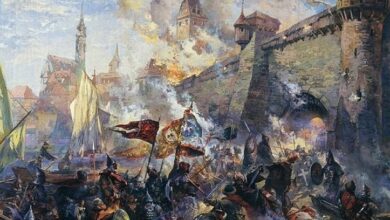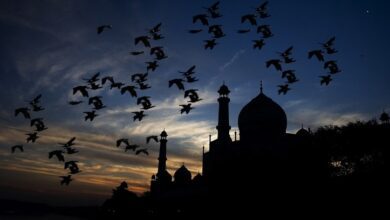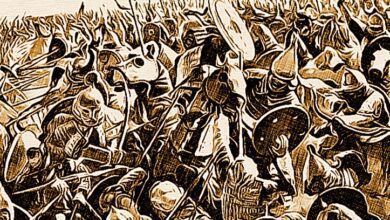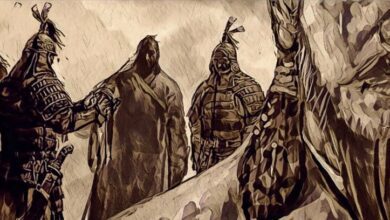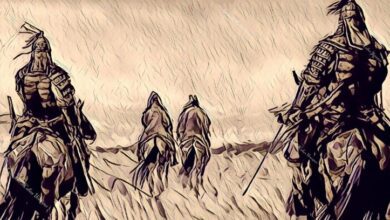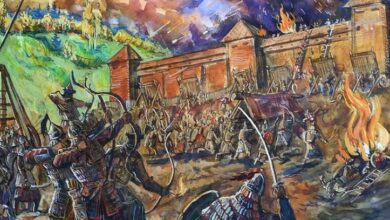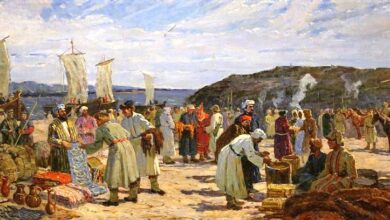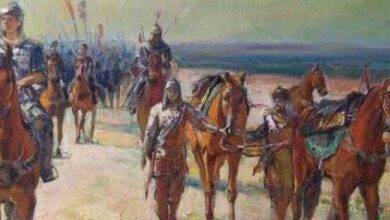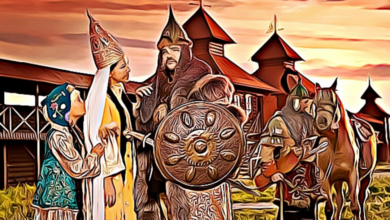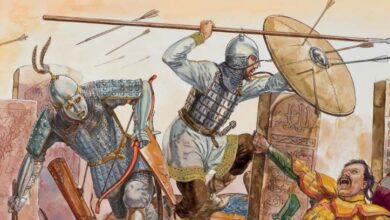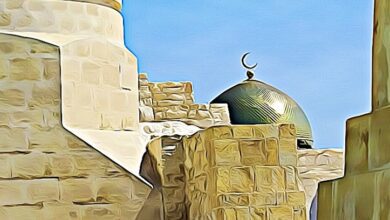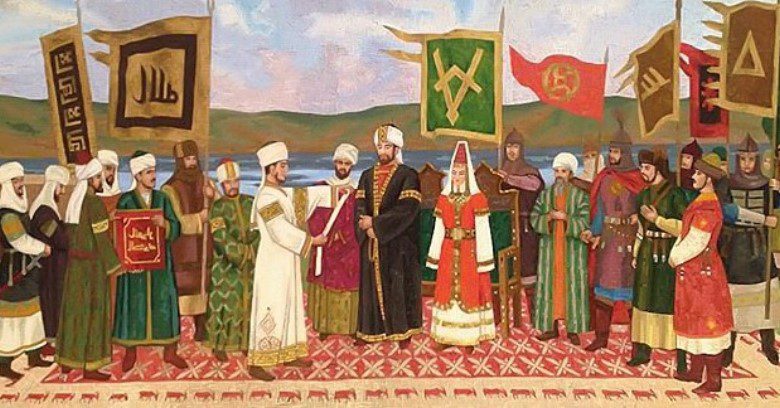
Ghazi Baraj Tarihi. Chapter 10
AT August Ambassador Razi decided to go back. Seid Ahmed Bakir and Ghazan insisted that Razi go along the Bukhara road, but Sheikh Hassan recalled the fate of the merchant Musa and convinced the ambassador of the preference for Khorys-yula ...
Razi set off on his way back, accompanied by Emir Mardzhan, Sheikh-Hasan, his son - from the daughter of Mardzhan Tuibiki - Taj, Balus ... They reached Arbuga on the ship of the eldest son of Karadzhura Salman. He was married to the daughter of Gazan Musalla and had from her ... the son of Saban - the founder of the Bellak house of Saban. And the representatives of this house were engaged in shipbuilding, navigation ~~ mainly south of Bolgar, trade in timber, salt, fish. Saban donated a lot of funds for the construction of Banji and its main mosque "Saban".
His son was Saksin, who donated money for the construction of the city of Saksin-Bolgar. His son was Jagel, who founded the good pier of Banji, his son was Yashel Kaf Urus. He defeated the Russian fleet twice. The first time was in 1025. Then, on the orders of the Galidjian bek Arslan, the Sadumians and the Galidjians knocked down the outpost of Dzhunne-Balik (Dzhunsky balik), founded on the order of Ibrahim by a descendant of Buri-Bash ..., and, approaching Bolgar, helped Azgar to occupy the capital. Yashel, who was then in Tukhchi, did not tolerate the humiliation of Emir Baluk and decided to take revenge. j When the Russians, rewarded by Azgar, went home, 1/ Yashel with his fleet overtook them to the west of the mouth of the Arsu, near the village of Naratlyk, and sank them. Here such famous Sadum beks as Burat, Urman and his son died... In memory of this, the village of Naratlyk was called Yashel Naratlyk, and the place of Burat's death - Burat, ./>, and Bek Yashel received the honorary nickname Urus. In 1032, Yashel went to the Timer-Kabak in Djurash from Banji. Then the Djurash emir was expelled from his city and asked Baluk for help against the rebels. By order of Ashraf, Yashel returned Timer-Kabak to Emir Rize and received the honorary nickname Kaf from the Kan. Then his son Urman, named after the Sadum bek he had defeated, married the daughter of Riza, and they had a son, Riza, named after the emir. After this campaign, Yaschel also founded the village of Timer-Kabak at the mouth of the Samar River ...
And the second time Kaf-Urus defeated the Russians in 1035, when the Sadum bek Khin-Kubar attacked the Bolgar with the Galidjian fleet.
65
Then Yashel sank several enemy ships and forced the Galidjians to jump out onto the shore, where they were trampled ...
And the son of Riza was Bel, called Imen. He gave money for the construction of Sarychin, so this city was also called Bela Imen. And it was on his ship that the Bulgar Abu Hamid al ~ Garnati arrived from Saksin in Echke ... The son of Bel-Imen was Sakal, his son was Urman, his son was Azgar, his son was Asla, his son was Atrak, born in 1220 ... [ A fragmentary extract from the manuscript of the code: “Atrak, the son of Asla or Ashla, was deprived of the fleet for crossing Gazan’s troops through Agidel and, having abandoned trade, became a kazanch. The center of his possessions was the city of Karadzhar or Karadzhura, which later became known in honor of Atrak Atrach. And his family was called Atratch.]
In Arbug, Marjan told Razi about the death of all Murdas from a terrible disease, during which a person experienced colic in his stomach, blushed and then died in unspeakable torment. Sheikh Hasan then told the people: "Accept Islam - and the Almighty will find a way to save you!" Everyone immediately accepted the true faith, built a mosque in the city of Burtas - and were saved, and the Murdas, who remained in paganism, perished to the last. The Emir invited the ambassador to visit and consecrate this mosque with a prayer, especially since Burtas was on the way, and Razi, excited by what he heard, agreed ... After a prayer service in the Burtas mosque, which the ambassador gave the name "Marjan", people from the neighboring Bellak fortress of Suba came to him and asked him to consecrate the mosque they had just built with a prayer. Razi did not refuse even here and went to the fortress, the mosque of which and the fortress itself were named after him by the people in memory of his visit ...
After the departure of the Grand Embassy, Almysh completed the division of the country into new provinces. In place of Bolgar, Bershud and Esegel, the provinces of Suvar were formed with a center in Nur-Suvar, Bolgar with a center in Bolgar, Martyuba, subordinate to Bolgar, Baityuba, with a center in Bulyar, Tamta ... and Kashan, with a center in the city of Kashan, later subordinate to Bulyar. And Kashan was founded by Jakin, who married the daughter of Abdallah and had a son from her, named after tebir Abdallah. Dzhakyn was completely devoted to the son of Mikail and even out of respect for him accepted Islam from his hands and the name of his father - Mikail. This helped the Dzhakyn family to become one of the few chosen ones. So, his son Abdallah was the governor of Bulyar, Suvar and Bolgar. And the former province of Biysu was divided into three - Biysu with a center in Gusman-Katau, Ura with a center in the village of Kargadan and Baigul, which was subordinate to Ure ...
66
On the advice of Abdallah ibn Bashtu, Ja'far reformed the tax system. Since the Igenchey-Sabans stained themselves with participation in the "War of Biys", he forbade this name and ordered to call this category of Igenchey Subashami - in memory of their support for the Kan. From that time, subashes were called Muslim Igencheis, who paid only a minimal and strictly defined tax to the state in money, livestock, furs or products. This tax, if necessary, could be replaced by other equivalent duties - the construction of roads, bridges, government buildings and others. Subashes were not taken to war, and only in the event of an enemy attack on the Bulgars did they form a militia. The Igencheys who remained in paganism were enrolled, at their request, either in the Chirmysh or Ak-Chirmysh, or in the Kara-Chirmysh. Chirmysh paid a tax in the amount of the Subash and, in addition, were in military service. During the war, they received part of the booty. At military training, they had to appear in full armament, which they purchased at their own expense. Any warrior, if he had a shortage of weapons, could be executed on the spot. He was also executed for disrespect for weapons. The Kara-Chirmyshs, on the other hand, paid a double subash tax, a tax in favor of the mosque, and, in addition, bore other duties in the amount of two subash taxes. In addition to these categories of state peasants, of which the subash and chirmysh were considered junior knights - bakhadirs - and could have weapons, under Gazan a new category of peasants appeared - kurmish. Kurmysh began to be called Kara-Chirmysh, who were obliged to pay their tax to the middle and highest chivalry - ulans or Kazanchis. Even later, some uhlans began to receive the lands of the Kara-Chirmysh in hereditary possession for special merits. Kurmysh could leave the Kazan, but in this case he would lose land ...
The masters in the cities made up the Suvari knighthood, for this category was formed according to the project of the Nur-Suvar merchants and craftsmen. Small masters-suvarchis were equated with bakhadirs, medium-sized - with beks, valis, centurions and inals, noble - with ulans ... In the event of an attack by enemies, they also had to make up the militias of the Kaves and, in addition, contain bulek (detachments) of hired soldiers and serve as yaubashami (officers) ...
67
In addition, Kan noticed that the country is very unfortified and at the same time surrounded by enemies. Replacing part of the Igenchi taxes with the obligation to build and maintain fortifications, Jafar undertook the construction of ramparts and fortresses. The Kan assigned Askal, who was married to the daughter of Almysh, to directly supervise this matter; Jafar sent bek Dzhulut as his assistants. These commissioners, together with the kap, seid Bakir and tebir Abdallah, traveled around the country and outlined the places for the construction of fortresses. From the Shepshe site near the Dyau-Shir, on the river, which was also popularly called Narat-Elga, they drove to the Marduan site on Akhtai, from it to the Urnash site on the Utig River [A fragmentary extract from the manuscript of the code: “And the city of Urnash after death the daughters of the Kan Mohammed-Alam Kyuhri - began to call her by her name "], from her - to the place Takta between Akhtay and Kichi-Chirmyshan, near which Byrak attacked the Turkmen. Seid blessed the construction of fortresses in these places, and the cities of Shepshe were built, which began to be called As-Kala, Mardan, Urnash and Takta. And the future founders of noble houses were the masters: Chuti from Takta, Abrak-Khum and Ubar. All of them - the Taktachis of Chuti, and the Chulmekchis of Abrak-Khum, and the Bakyrchis of Ubar later moved to Bandzha, and their descendants made up the noble houses of the Taktachis, Chulmekchievs, Timerchievs, Altynchi.ev and Bakyrchievs and in Bandzha, and in Bolgar, and in Bulyar, and Nur-Suvar ...
And then the fortresses of Torkoch (Terkech) were renovated in Sulcha, in Nur-Suvar, which was also called Baryntu - in memory of the stay of the baryns of Alabuga here, fortresses were built in Kermek, which was named after the son of Askal Kermek, Tersek on Sulcha-su, Deber on Zyuya-Idel. And Deber was the last fortress built under Almysh. Then, under Gazan, the fortresses Matak were built between Kichi-Chirmyshan and Sulcha, Nukrat between Akhtay and Kichi-Chirmyshan, Bandzha, Bulyar, Kamysh on Kinel, Simbir, Gazan-Deber on Zyuya, Kashan and Tukhcha on Agidel, Tau-Kerman nearby from the mouth of the Zyuya-Idel, Tash-Bolgar, Subash-Simbir, Tash-Simbir and Karadzhar on the Mountain side, Jilan on Chishma. In total, there were already thirty cities under Gazan, which is why the saying has been preserved since then: “Gazan patsha zamanynda utyz kala” ...
In 924, the emir Marjan or Mardan died, in whose memory the province of Bellak was also called Mardan. Balus married his daughter Suzbi, and after the death of Mardan, the Bellaks appointed Bek as the governor of their province. The Mardanians received this right to elect their own governors from the Kan for supporting him during the “War of the Biys”. In addition, the governors of Bellak received the title of emirs, which was worn only by relatives of the Kan and a few noble beks ...
Although Mardan did not always get along with Almysh, the Kan took his death hard. “The Almighty has already taken all my brothers to his court, which means that soon it will be my turn,” he said to tebir Abdallah. Preparing for a journey to another world, Jafar was in a hurry to complete the reforms he had begun. He granted autonomy to the inhabitants of Bolgar, and then to Nur-Suvar. In Nur-Suvar, the El-Khum mosque was later built, at the madrasah of which the El-Khum brotherhood arose. The members of this brotherhood, renouncing luxury and other worldly temptations, tirelessly spread the light of the true faith throughout all the provinces of the state...
Balus, jealous of the Suvars and Bulgarians, also launched the construction of cities and fortifications. So, in 925, he built a new capital of Mardan - Bandzha, which both Bandzha-Burtas and Nusha-Banja began to be called ... The Banjians gladly assigned the name "Saban" to their cathedral mosque, because it reminded them of ancient privileges and origin from the Sabanian clans ... He also built several taverns on Idel, one of which he named after his wife "Suz-Uryna". Balus always consulted with his wife before making any decision. And among the people, Suzbi enjoyed such respect that after the death of her father, she ruled Bellak for some time. However, in Mardan, all the most important decisions were made by the majlises of the districts: the right-bank ones - Burtas and Arbuginsky and the left-bank ones - Badjanak and Kinel. Unlike the Majlises of Bolgar, Suvar and Bulyar, they were dominated by the descendants of biys, who were called aksakals. Descendants of the Saban, Saklan and Modzhar biys prevailed in the right-bank districts, while in the left-bank districts, the descendants of the Kyr-Bajanak biys prevailed. During the years of the invasions of the Turkmens, Kypchak Turks and Manguls, many Mardan Badjanaks fled to the right-bank districts of Bellaka and Tamta-Bashkort. Under their influence, part of the Modzhar Bulgars began to pronounce "c" instead of "h", and the Bashkort Bulgars began to pronounce "h" instead of "s". For example…
Mardan received his greatest income from trade duties, because all the roads from Inner Bulgaria to the west and south went through the cities, taverns and menzels of Bellak, and because these roads themselves were very well maintained. It got to the point that merchants from Bolgar preferred to get to Kan not through Martyuba, but by a longer, but better way - through Bellak. The people of Mardan were very proud of the fact that the great ambassador also passed through their land. Razi passed through Arbuga, Burtas, Razi-Suba, the lands of the Mukhshi Bashkorts or Modjars, subordinate to Burtas, and left Bellak through the last Bulgarian station to Khorysdan-yuly Boryn on the river Boryn-Inesh, a tributary of the Shir. Then Boryn began to be called Yauchy. About why the river was named so, historians speak differently. Some say that it got this name due to the location of the station on a boryn (cape) in the bend of the river. Others say that the river in this place reached the nose of the first Bulgarian merchant crossing it, and therefore he called it Boryn-Inesh. And before that, the great ambassador rested after Razi-Suba at the Kuper or Kubar stations on the Kubar River, Burtas-Simbir near the Karga River, Jozek, Yshna on the Yshna River, Leubat or Aibat ...
68
69

